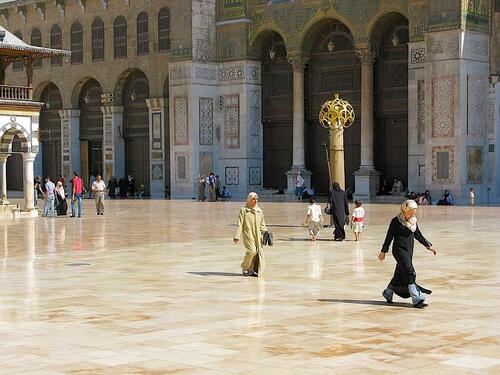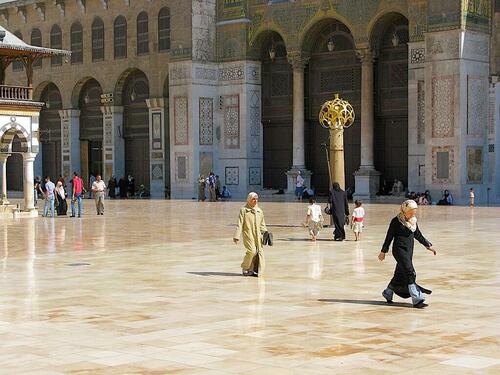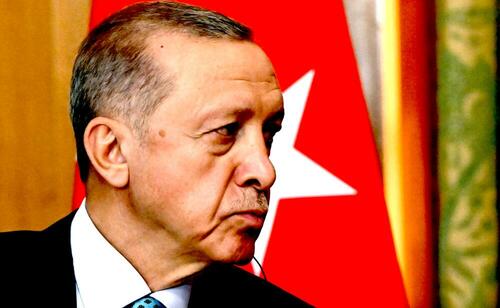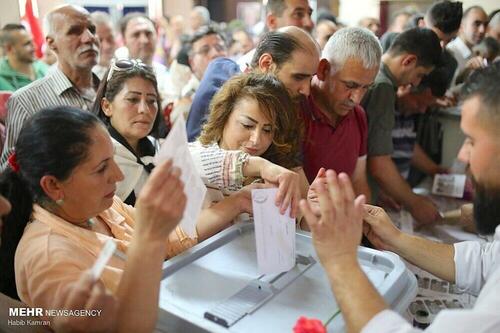Six Scenarios For Syria
Authored by As`ad AbuKhalil via Consortium News,
The situation of Syria is like the chaos of Libya but there are many more actors (local and external) operating, making it difficult to foresee what will happen…
It is naive to assume that the current regime in Syria will remain in place – as it is – going forward…
Syria is now in a state of uneasy transition and the political-military situation will remain in flux as long as the conflicts between the various armed and civic groups are not resolved.
We have seen during the age of the Arab uprisings that the collapse of a regime does not necessarily produce a stable or a democratic government. In Tunisia, the democratic transition was concluded when the current president decided to exclude the Islamists from power and to rule as a despot.
In Egypt, the UAE and Saudi regimes helped install a military government headed by Gen. Abdel Fattah al-Sisi to end the elected rule of the Muslim brotherhood. The conflicts in these countries are not purely the outcome of internal developments, but often reflect regional conflicts, conspiracies and competition.
Turkey and Qatar support the rule of the Muslim Brotherhood, while Saudi Arabia and UAE support their ouster and exclusion from government. This will be central in understanding what comes next in Syria.
Israel and the U.S. are close to the Saudi-UAE camps but are also close to Qatar; and the Muslim Brotherhood seems to work well with the U.S. and even avoid pushing a radical line against Israel.
June 16, 2012: Street in Cairo during second round of presidential elections, which Muslim Brother’s candidate Mohamed Morsi won. (Jonathan Rashad, Flickr, CC BY-NC-SA 2.0)
President Mohamed Morsi of Egypt did not attempt to abrogate the peace treaty with Israel and even allowed the continuation of the military-intelligence coordination with Israel.
Furthermore, after a meeting at the Washington Institute for Near East Policy (WINEP) in Washington, Rashid Ghanoushi, head of the Islamists of Tunisia, complied with U.S. wishes and froze a push in the Tunisian parliament to criminalize normalization with Israel.
Syria is a more complex political and military situation for several reasons.
The U.S. maintains an occupation of sizable territory in Syria. Whenever the U.S. keeps troops in a country that operates outside the control of the local government, that the country (or a chunk of it at least) is under U.S. occupation.
In Iraq, the U.S. maintains a few thousand troops, but it continues to wield tremendous influence over the government and rejects parliamentary calls for the withdrawal of those troops.
We learned in recent weeks that the size of the U.S. military force in Syria is double what the public has been told, and the presence even of a small military contingent requires a sizable military suppor force in the region.
The U.S. is not only fighting ISIS (while the U.S. does not give a timetable or a roadmap for its unending fight against ISIS) but it also provides support for militias that are under its control in Syria.
The U.S. preaches state monopoly of the use of force in the Middle East except where U.S. surrogate militias operate in a country.
Turkish & Israeli Roles
Turkey has a strong military presence in Syria and — like the U.S. — can easily influence developments on the ground, making things easier or more difficult for whatever government that may arise in Syria. Turkey’s military and intelligence intervention was key to the ouster of Bashar Al-Assad.
Israel has expanded its occupation of Syrian territory and has been conducting hundreds of bombing raids inside the country after the collapse of the regime. Like the other actors, Israel wants to shape the orientation and policy of the future government and seeks to prevent a radical or democratic regime from emerging.
The regional conflict has not been decisively resolved yet.
So far, the Turkish-Qatari-Israeli-U.S. axis has scored major successes in Syria (thanks to their support or indulgence of the former Al-Qa`idah militia which now runs the country) but Russia and Iran may still try to either take revenge or enhance their regional power status.
Russia lost a major strategic military presence inside the country, while Iran lost the direct link to Hizbullah, which passed through Syria.
More than in the cases of Tunisia and Egypt, there are many militias operating in Syria, and they all have external sponsors. Outside powers will be involved in the formation of the new government in Syria.
The situation of Syria is like the chaos of Libya but there are many more actors (local and external) operating there.
Turkey’s President Recep Erdogan in September 2023. (Sergey Guneev, RIA Novosti, President of Russia)
The Six Scenarios
While it is not clear how the local and regional conflicts will affect the emergence of a new and potentially stable government in Syria, it is possible to consider these scenarios.
1. Libyan Model
Syria may very well follow the example of Libya. Like Libya, the regional conflicts between those who support the Islamists and those who abhor them may play out for many years to come.
The Obama administration promised with great excitement a new democracy in Libya and an end to tyrannical rule after the NATO assault in 2011.
In Syria, the various Islamist militias have a history of bloodshed that may not end just because Hay’at Tahrir Sham (HTS) has taken control of the central government — at least formally.
The size of the new government’s militia is not large and it may face military challenges from various fronts. If Syria were to follow the scenario of Libya, it would mean that Russia, Turkey, Qatar, UAE and the U.S. will all be involved. It would also bring in Israel, which harbors keen interest in establishing a client regime in Damascus.
The massive Israeli bombing of Syria since Assad’s fall was intended to demolish Syria’s military infrastructure and intimidate the new government. HTS quickly signaled it has no agenda against Israel, and does not concern itself—not even verbally—with the aim of liberating Syrian territory from Israeli occupation.
The potential for disintegration and fragmentation is particularly high because Syria is far less homogeneous (ethnically and religiously) than Libya. The crackdown by the new government against Alawites has triggered outrage and calls for self-defense in the Alawite region.
2. Military Coup
The UAE and Saudi Arabia may very well arrange for a military coup to install a client military despot, like Sisi in Egypt.
The UAE was instrumental in the Egyptian coup of 2013 and its media have been alone in expressing alarm regarding the new regime in Damascus. After all, the UAE’s ruler was in close contact with Assad to the very end and was steering him away from Iran and the “axis of resistance.”
In fact, since Assad’s rapprochement with the UAE began he had been restricting the movement and activities of Iranian and Hizbullah military officers. This coup scenario would work to establish a regional alliance of republican despotic regimes tied to the Saudis and the Emiratis.
Of the two, the UAE has thus far been more successful in imposing its political and military will in Somalia, Yemen (south), Libya, Sudan (with the RSF) and Egypt.
An installed military regime could easily be integrated into the Abraham accords once the Saudis reach agreement with Israel on a peace treaty. The problem with this scenario is that the UAE is the chief opponent of the Muslim Brotherhood in the region that wields influence in Syria.
That would mean imposing brute force against them just like in Egypt, which had been the Brotherhood’s base before and after the fall of Hosni Mubarak.
3. Democracy
Voting in the 2021 Syrian presidential election. (Habib Kamran/Wikimedia Commons)
The new government would heed the call of many Syrians and begin a transitional period in which free elections are held and a new constitution is drafted. That would lead to the formation of a democratic government, something that Syria has not experienced since the 1950s when the democratic order was very flawed and subject to outside intervention and manipulation.
This democratic scenario would alarm both Israel and the U.S. who are keenly aware that people— left to their own devices – -would not necessarily serve Western and Israeli interests. Despotic rule is always preferable to the West and Israel. The U.S. hasn’t yet lifted its cruel sanctions against the Syrian people (though it did lift the $10 million bounty on the HTS leader’s head) because Washington can use it to blackmail any future Syrian government.
4. HTS Dictatorial Rule
The HTS would monopolize political power and rule alone disregarding demands for wider representation. Such a scenario would alarm religious minorities and women given the ideological origins of the new rulers. The U.S. and Israel may favor this scenario if the alternative is an uncontrollable democracy near Palestine.
5. Syria Breaks Up
Syria could lose its territorial integrity and become a patch of semi-independent, sectarian enclaves where the Druze would govern their own province, and the Alawites and Kurds would do the same ad so on. This scenario would be too alarming for Turkey, which is willing to use military force to crush an independent Kurdish statelet inside Syria.
The West and Israel would favor such an outcome; after all, Joe Biden and Antony Blinken advocated dividing Iraq into three enclaves after the American invasion of 2003. If this scenario arises, Northern Lebanon (Tripoli and Akkar) may ask to join the Sunni enclave.
6. Restoration
The least likely scenario entails the restoration of the old regime with the assistance of Iran and Hizbullah. Members of the “axis of resistance” are furious at Assad for abandoning power so quickly; they are also outraged over revelations of his close coordination with the UAE to distance Syria from Iran.
Iran and Hizbullah have been weakened and won’t risk their forces to defend the ousted regime if Assad indicated he wanted to return. Their intervention in Syria on his behalf would trigger Israel targeting them.
It is most difficult to predict the political future of Syria. It has never been an easy country to govern and the nightmarish experience of living under the Assad regime for decades embittered many Syrians.
But the ideology the new rulers of Syria brings is too alien to a society that is diverse and has a history of secularist tendencies. There are many claimants to power inside the country, and a multiplicity of outside powers who want a piece of Syria (figuratively or literally).
Whatever happens, the next phase will not be peaceful.
Tyler Durden
Mon, 12/30/2024 – 21:45






Recent Comments